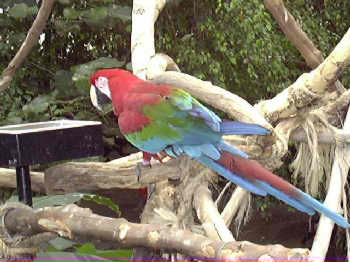
Please Help our Pets by Donating One Dollar
Since birds don't have hands like we do, they use their
beaks to bite when they want to communicate something.
It's your job to play Sherlock Holmes and figure out what
is causing your pet bird to bite.
Some of the Most Common Reasons Birds Bite
Biting for Communication
Perhaps a bird has tried to tell you something through his
body language and you just didn't understand, so the bird
bites to get you to understand he's not happy or perturbed,
or isn't liking something.
The most common reasons a bird is upset are that he may
be frightened, threatened, under stress, feeling ill,
or cranky (not enough sleep) or during molt.
Prevention lies in removing whatever may be threatening
to scaring the bird or putting it under stress. If there
are no obvious signs then a vet checkup is in order.
Biting From Fear
When birds in the wild become fearful, they take off in
flight. A caged bird cannot do this, so they bite to ward
off the source of the fear.
Remove all sources that may cause a bird to fear, such
as other pets, being startled suddenly, the appearance
of strange people. Use a calming tone of voice when
approaching the room where your bird is if bringing a
new person to the bird, and have the new person be quiet
and not make any sudden moves toward the bird.
If a bird does become aroused and shows fear, then slowly
back away.
If other pets are a source of the fear, then don't allow them
near the bird. Usually birds will accept the presence of
other pets, but it's often a gradual process.
Biting for Food
One of the first things baby birds learn is to use their beaks
to eat. Birds in the wild constantly are feeding with their
beaks, as are pet birds. Pet birds often see a hand as
a source of food and thus bite at it.
The way to prevent this from happening is never feed a
bird from your hand. If your bird bites because it thinks
your hand is a Big Mac, then try using a spoon, tweezers or
holding the food bowl instead of your fingers.
Biting for Medical Reasons
When a bird feels ill, it often may want to be left alone
and will bite if disturbed.
Have the bird examined for illness.
Biting for Play
Birds usually love to play and if a person is playing
with them, biting can happen. It may not be an aggressive
bite, but can be painful none the less, especially for
children. During play a bird can become over excited or
lose their balance and bite. The bird is not at fault here.
If you do play with your bird, then you will be at risk
of getting some occasional bites. It's really best to
provide your bird with a wide variety of toys to play
with, you can dangle toys from a chain or rope, but
it's best not to keep the toys in your hand, or let
younger children handle birds with their bare hands.
Biting for Territorial Rights
Any bird may bite when you reach into a nest box or cage.
Birds establish a territory and will defend the right
to own that space with aggressive behavior such as biting.
This can also happen with a bird's favorite toy if they
believe the toy is being taken away.
Some birds can become control freaks and
Biting to Guard the Owner
Birds can and do become very attached to their owners.
If the bird feels this relationship is threatened it may
bite other people or pets who the bird feels is coming
between the relationship.
To avoid this kind of biting, keep the bird caged or
in another room when other people are around.
Biting to Avoid Punishment
If you have punished your bird for some offense and
the bird makes the same mistake, it may bite out to
avoid being punished. On the opposite end of this, some
birds may even learn to bite when they want to be
rewarded or have something done for them.
Biting Because of Hormones
For many species, mature adult birds can become
aggressive and much more protective of their mate and more
likely to defend their cage as their area.
Hints to Help Avoid Bird Bites
* Don't clean the cage with the bird inside
* Be calm and talk in a low tone of voice to birds
* Don't make any sudden or quick moves that may startle birds
* Show your bird lots of love and attention
* Learn how to handle and hold a bird properly
* Don't encourage aggressive playing
* If the bird has done something wrong, don't yell, a
simple, firm no is enough
* Bright or flashy clothing or nail polish can be overly
exciting to some birds, be careful of what you wear
* If your bird flies around the house, trim it's flight
feathers, a bird will bite more if it knows it can safely
fly away afterwards
* Daily interaction helps build a trusting relationship
* Make sure the bird gets enough sleep at night
See Also:
The Language and
Communication of Birds
Feather Picking
Why Do Bird's Sing
How To Tell If A Bird
Is Sick
Is Your Bird Sick?
Is Your Bird Bored or
Unhappy?